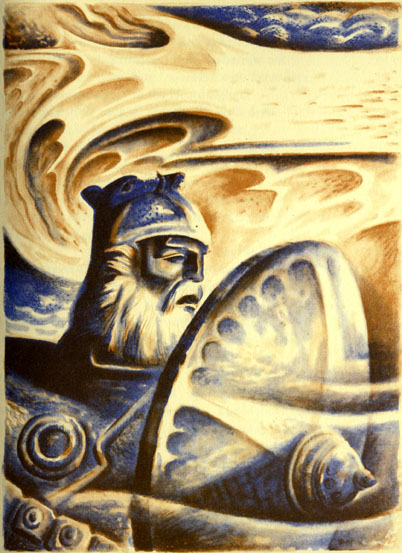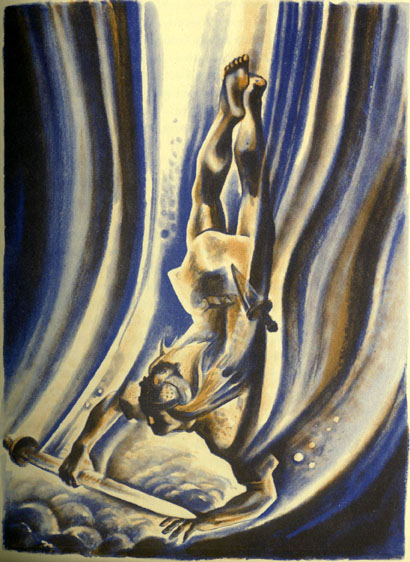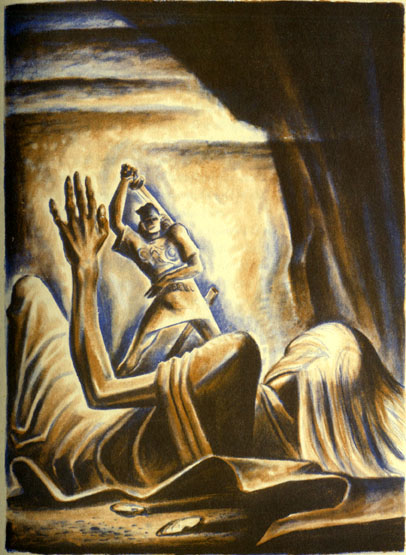
The action of the scene reveals some of the personality traits of the characters. Beowulf, as the hero and protagonist of the play, seems to represent the quintessential warrior in this section of the poem. As a typical Anglo-Saxon warrior, Beowulf leaves all to fate and looks forward to his battle with Grendel’s mother. He shows his loyalty and camaraderie with his soldiers by asking Hrothgar’s assurance that they are taken care off in case of his death. His strength is clearly depicted in his battle scene with the monster. Beowulf’s ability to do thinks that ordinary men couldn’t (such as swim underwater for hours without air, carrying pounds of heavy weight while swimming upstream) shows that he is a superhero. He even dares to take on Grendel’s mother without weapons. With all of his great attributes, Beowulf comes out of this scene a hero and companion of good.
Also, Unferth is greatly characterized here, though indirectly. In previous scenes, Unferth is characterized as being a brother-slayer. In Anglo-Saxon society, there was nothing as abysmal as killing your own brother. Yet, he has a position of honor in Hrothgar’s court. He is also power-hungry and jealous of Beowulf’s claim to rid the people of the monsters. In this scene, the mention of Beowulf using Unferth’s sword shows his cowardice. Instead of being a warrior and fight for his people, he stands in the shadows and lets a foreigner (Beowulf) do the work for him.
Many of the quotations present in this passage are vital to the understanding of the poem, as well as Anglo-Saxon society in general. In his speech at the beginning of the section, Beowulf settles his affairs. As well, he asks that Hrothgar take care of his men, requesting that he “ be guardian of my young retainers, my companions, if battle should take me.”(Howe, pg.26) This quote is representative of the familial bond between the warriors of that time. Through the comitatus, the warriors pledged their allegiance to the king till the very end. They were with each other, by each other’s side, at all times, most especially in battle. Therefore, they knew each other and probably loved each other more than their own blood relatives. Also, this passage exemplifies how a warrior goes into battle. Anglo-Saxon warriors tended not to worry about their future because they believed it was out of their hands. This is exactly how Beowulf presents himself here.
Another key passage is during the battle underwater between Grendel’s mother and Beowulf. After Hrunting fails to pierce the monster, Beowulf drops the sword and tries again with his own hands. The scop or poet uses the explanation that “so ought a man do when he thinks to get long lasting praise in battle.”(Howe, pg.27) This passage expresses the desire for fame and immortality. To be remembered, warriors had to the extraordinary. Only those brave and courageous men would have their adventures chronicled by the oral historians, or the scops. In the verse, their deeds lived on for centuries.
Finally, Beowulf decapitation of dead Grendel is symbolic of the policy of wergild. Wergild was the agreement to pay retribution for any wrongdoing perpetrated against another clan. This scene may be Beowulf’s way of taking revenge against Grendel for not paying wergild. Also, this may have been Beowulf’s way of insuring that the monster was truly dead.
Beowulf may be a tale of adventure and camaraderie; however, it also has various religious ideas or beliefs that are intertwined in the story. Though written during a pagan time, there are several Christian references in the poem. For example, as Beowulf is being dragged under and attacked by Grendel’s mother, the narrator mentions that not only did his mail shirt protect him, but also “Holy God, who brought about victory in war.”(Howe, pg. 27) The monk who transcribed the manuscripts, however, may have included these references. It may have also been the wish of the scop at the time to try and convert his audience to Christianity. Also, the entire scene while Beowulf is underwater could be compared to the crucifixion of Jesus. Just as Jesus’ actions saved us from sin, Beowulf’s actions cleanse and save Hrothgar’s people from this terrible evil.
Beowulf the King
Created By Judith Mathieu, JM86812n@pace.edu
Nancy Azcona, DaNana31@aol.com
Last Modified: March 21, 2004
|


